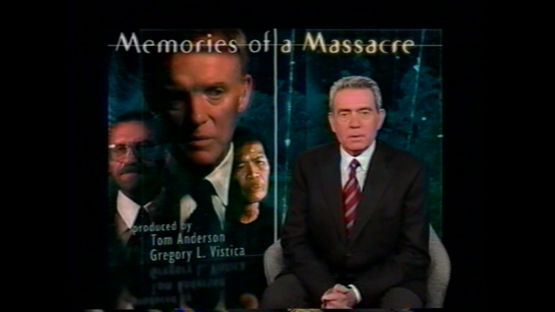"Memories of a Massacre" was one of 60 Minutes II's most powerful stories. Divided into three parts, the program was co-produced by CBS's Tom Anderson and Gregory L. Vistica, who also wrote the story that appeared in the April 25 New York Times Magazine. In the first part, former senator and governor Bob Kerrey discusses his involvement with the massacre at Thanh Phong during the Vietnam War. He first recounted that the killing of about twenty unarmed civilians, men, women, and children, happened as a reaction to enemy fire; a terrible accident of war. The investigative team traveled to Vietnam, where it found a survivor, Mrs. Lanh, who told a different story about purposeful killing. Her story was independently confirmed by Gerhard Klann, a member of Kerrey's unit in Vietnam, who described, for the first time in over thirty years, how the then twenty-five-year-old Mr. Kerrey ordered the killing of the civilians because he felt it was the only way for his men to retreat safely. As the New York Times explained, this account was contested in the Times Magazine article by another unit member, Mike Ambrose. Mr. Kerrey agreed to sit for a second interview to revisit the events.
The story led to protests, allegations of "war crimes," and a general conversation about war, memory, and the role of journalism.
The three-part story received a Peabody Award in 2001 with the following comments: "A Peabody goes to CBS’ 60 Minutes II: Memories of a Massacre. Co-produced by Gregory Vistica and Tom Anderson, this painfully honest segment investigates the actions of an American Navy SEAL unit under the command of former Senator Bob Kerrey that took place in the village of Thanh Phong, Vietnam, in February 1969. There, civilian men, women and children, as well as enemy guerrilla fighters, were killed in bloody close combat. Kerrey’s personal recollections of the events are framed by his admission of guilt and of unrelenting awareness of the horror of the night in question. One member of the unit, however, disputes Kerrey’s account and argues that the actions did, in fact, constitute unnecessary massacre. After this account was filmed and the production team also traveled to Vietnam to interview a survivor of the action, Kerrey sat for a second interview in which he confronted the accusations. He explains that, under the rules of engagement as he and his men understood them, the actions were justified. Interviewer Dan Rather leads Kerrey to this point in an exceptionally careful manner. In his summation, Rather suggests without exoneration that the terror of war can confront good people with the most horrible of choices and propel them toward terrible actions. For a brave public accounting of most dreadful events, CBS’ 60 Minutes II: Memories of a Massacre receives a George Foster Peabody Award."
In his acceptance speech, producer Tom Anderson praised Dan Rather and "his interview which drove the story, probing and revealing, without being disrespectful or too confrontational."


